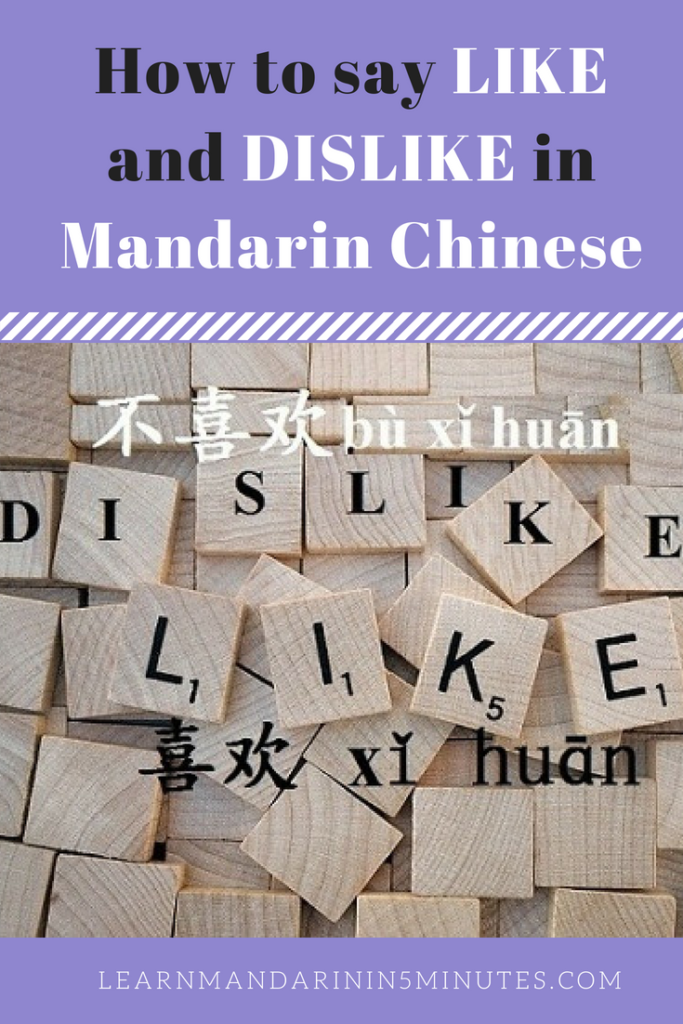Like and dislike in Mandarin Chinese
Simple Mandarin Chinese phrase for beginners. To learn a language well, any language, we need to speak, listen and write more often. It is useless if you just accumulate your Chinese vocabulary lists and not use them at all.
Do you know what is like and dislike in Mandarin Chinese? If you don’t, you have come to the right place. Today, you will walk away knowing how to use, pronounce and communicate with your Chinese speaking friend using these two Chinese phrases xihuan and bu xihuan.
Meaning and Components of like 喜欢 in Mandarin Chinese
喜 xi
Meaning:. like, love, enjoy, to be fond of, to like, to enjoy, to be happy
HSK Level : Level
Radical : 口
Component : 壴
Stroke Count: 12
Pinyin: xǐ
Parts of speech: verb, adjective
欢(歡) huan
Meaning:. happy, pleased, glad, joy, enjoy
HSK Level : Level 1
Radical : 欠
Component : 又
Stroke Count: 6
Pinyin: huān
Parts of speech: adjective, verb
How to express dislike in Mandarin Chinese
If 喜欢 xǐ huān is like, what is dislike or don’t like in Chinese? Well, in Chinese, when you want to say something in the negative, you simply use the Chinese word 不(Bù no/don’t/dis-) before the Chinese phrase. Thus, dislike or don’t like will be 不喜欢 Bù xǐ huān. Simple? Yup!

Dialogue
Dialogue is important in learning a language. You need to activate your speaking and listening skills. It is one thing to know how to speak, it is another thing to understand what the other party is talking about or asking. It involves 2 way communication.
I saw a variety programme on TV, and this Korean guy went to Japan armed with a Japanese translation app. He spoke in Korean and the app helped him to translate into Japanese. He took a taxi and spoke to the taxi driver using the Japanese translation app. The taxi driver was impressed with his Japanese speaking skill and started having conversation with him. He started panicking as he could not understand a word of what he was saying. That goes to show, you not only need to know how to speak, but you definitely must also brush up on your listening skills.
Ok, that being said, let us see how the Chinese phrase 喜欢 xihuan and 不喜欢 bu xihuan are being used in the dialogue below
A: 你喜欢什么?
Nǐ xǐ huān shén me?
What do you like?
B: 看电影,听音乐我都喜欢。
Kàn diàn yǐng, tīng yīn yuè wǒ dū xǐ huān.
I like both movies and music.
A: 这首歌很好听,你喜欢吗?
Zhè shǒu gē hěn hǎo tīng, nǐ xǐ huān ma?
This song is very good, do you like it?
B: 喜欢。可是,我不喜欢那位歌手。
Xǐ huān. Kě shì, wǒ bù xǐ huān nà wèi gē shǒu.
Yes. However, I dislike / do not like the singer.
Traditional Chinese
A: 你喜歡什麼?
B: 看電影,聽音樂我都喜歡。
A: 這首歌很好聽,你喜歡嗎?
B: 喜歡。可是,我不喜歡那位歌手。
How to ask question using 喜欢 or 不喜欢
In Chinese, when you want to ask a question, you just need to add 什么 or 吗 after the Chinese phrase. For example, when you want to ask the What question, you ask 喜欢什么?When you are asking do you, you ask 喜欢吗?Very simple isn’t it. 5 minutes of your time and you have already learned 喜欢,不喜欢,什么 and 吗.
Pyramid Drills
Expanding the Chinese words you know is very essential in learning the Chinese language. After you know that like and dislike in Mandarin Chinese are 喜欢, and 不喜欢, how do you actually use them in your conversation.
As you know, 喜欢 xihuan is an adjective. You can place a Chinese verb after 喜欢 to form a sentence. For example, in the dialogue, B said 喜欢看电影, 喜欢听音乐.
Let us expand base on these two sentences, so that you can carry on with the conversation with your friend. You can’t hold a conversation well if you don’t learn word expansion.
喜欢看电影
Xǐ huān kàn diàn yǐng
I like to watch movies.
喜欢看中国电影
xǐ huān kàn zhòng guó diàn yǐng
I like to watch Chinese movies.
喜欢看中国武打电影 / 喜欢看中国武打片
xǐ huān kàn zhòng guó wǔ dǎ diàn yǐng/ xǐ huān kàn zhòng guó wǔ dǎ piàn
I like to watch Chinese martial art (Kungfu) movies.
喜欢看李连杰演的中国武打片/ 电影
xǐ huān kàn lǐ lián jié yǎn de zhōng guó wǔ dǎ piàn
I like to watch Chinese kungfu movies by Jet Li.
Traditional Chinese
喜歡看電影
喜歡看中國電影
喜歡看中國武打電影 / 喜歡看中國武打片
喜歡看李連杰演的中國武打片
Base on the Chinese phrase 喜欢看电影, we have expanded the sentence by adding 中国, 武打 and 李连杰演的. You can use other Chinese words or Chinese vocabularies to expand your Chinese phrases, so that the conversation can progress smoothly rather than one sided.
Why don’t you try to expand the other sentence 喜欢听音乐. Hope you can create more than 4 sentences. ^^
As for 不喜欢, how many layers can you create? Let us try.
不喜欢
Bù xǐhuān
dislike
不喜欢吃菜
Bù xǐhuān chī cài
Don’t like to eat vegetables
不喜欢吃芥兰菜
bù xǐhuān chī jiè lán cài
Don’t like to eat kale
不喜欢吃煮过头的芥兰菜
bù xǐhuān chī zhǔ guò tóu de jiè lán cài
Don’t like overcooked kale
We have created only 3 layers, why don’t you try to add on them?
We would love to see how many layers or sentences you have managed to create from 喜欢看 and 喜欢听. Do email your sentences to us so that we can share with everyone.
Alternative to 喜欢
Instead of saying 喜欢 xinhuan to mean like, you can also use 爱 Ài . For example, if you like to watch movies, instead of saying 我喜欢看电影,you can also say 我爱看电影. Therefore, the negative form will be 我不爱看电影.
Do you like this post?